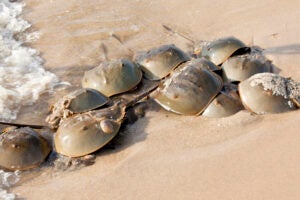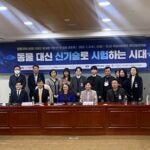
SEOUL—Animal protection organization Humane Society International Korea (HSI/Korea) welcomes the Ministry of Food and Drug Safety’s announcement of a phaseout of the use of horseshoe crab blood for toxicity tests. Alternatives are available, and a synthetic recombinant Factor C (rFC) will be used instead of wild-caught horseshoe crab blood.
The horseshoe crab is a blue-blooded marine species, more ancient than dinosaurs. Now, its population having dwindled, it is endangered according to the International Union for Conservation of Nature. Capture and bleeding for pharmaceutical use has not helped, as an extract of horseshoe crab’s blood, Limulus amebocyte lysate (LAL) is used to test the toxicity of some biological products. To obtain that extract, horseshoe crabs have been the target of human catch for many years and the entire ecosystem associated with them has been put under severe stress.
Humane concerns about how horseshoe crabs are caught, transported and restrained to extract a significant amount of blood, a process which involves long periods out of the water, has helped drive the use of rFC as an alternative. Use of the alternative will alleviate the threats to the ecosystem of which horseshoe crabs are a part. More specifically, it will ensure that the flow of essential materials (reagents) for the testing of biopharmaceutical products will continue uninterrupted, independently of horseshoe crabs’ numbers, with a more sustainable, validated and consistent methodology. It will guarantee that drugs, biological products, including vaccines and medical equipment, will be available and released on time.
The Ministry of Food and Drug Safety’s announcement places South Korea on the same plane as other regions (Europe and North America) and countries (Japan, China) that recognize or provide guidance on the use of rFC.
HSI/Korea Director, Government Affairs Borami Seo said “We welcome the government’s decision to accept this horseshoe crab replacement method at a regulatory level. It is important to update regulatory guidelines with more scientific, non-animal replacement methods. However, its implementation also should be emphasized to ensure wide use of the new method. We urge the authority to provide support for industry to actively adopt the rFC method.”
ENDS
Media contact: Borami Seo, director of HSI/Korea; bseo@hsi.org



